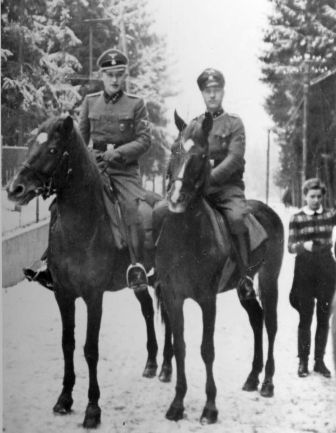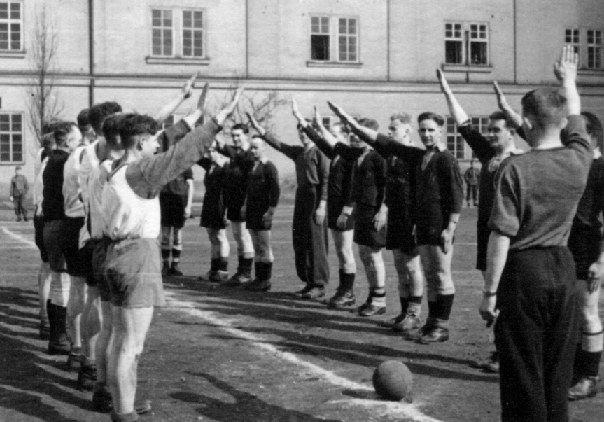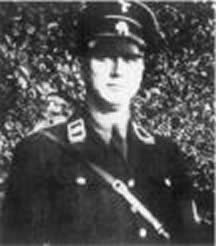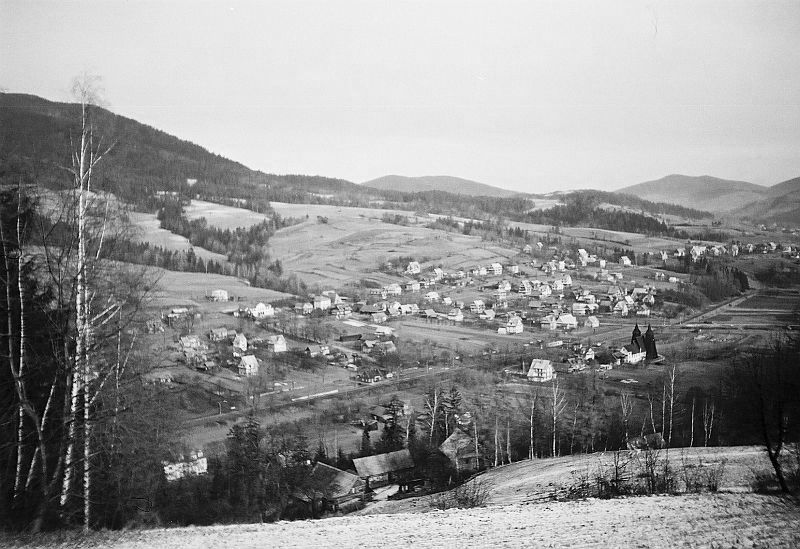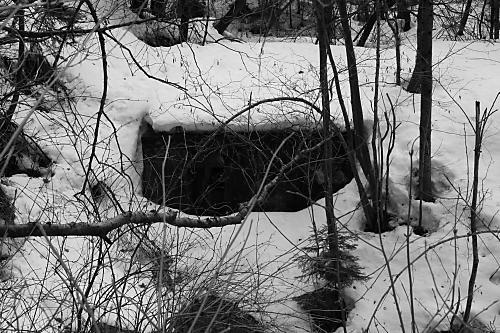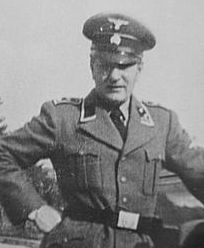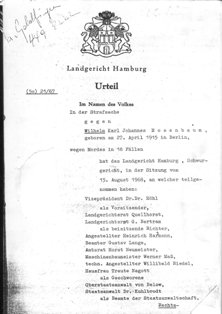Wilhelm Rosenbaum
The Commandant of the Sipo –SD School in Bad Rabka
Wilhelm Rosenbaum was born on the 27 April, 1915 in Prenzlauer Berg, Berlin. His father, Peter Rosenbaum was a municipal worker at the central covered market at the Alexanderplatz. His mother died when Wilhelm was just one year old.
His father re-married which brought forth the stepbrother of Wilhelm, Franz, born in 1910. He has been listed as missing since the Second World War. The second marriage was dissolved after three years. In about 1917/18, his father married a third time. From this marriage comes the other stepbrother Kurt, born in 1919. He lives today in Freyburg.
Wilhelm had an unhappy childhood, experienced rejection and had to stand on his own two feet at a relatively early age. He spent his childhood with father and stepmother in Berlin, in a 3 room apartment. Since this accommodation quickly proved insufficient, Wilhelm was found a place in a catholic boarding school.
When he was 6 years old, he entered the ‘Volksschule’ (elementary school) until the age of 11 years. He then moved onto the ‘Realschule’ (secondary school) where he dropped out after the third grade, at the age of 16 years. His school reports were poor. It was said, that this was due to a bad, oppressing circumstances at home, holding back his development in every way.
The Stepmother despised, beat, harassed and insulted him as well as his brother Franz. She looked upon them as ‘Polackenkinder’ (Polish children) the women whom his father had married in the first and second marriage were ‘Hurenweiber’ (whores).
Wilhelm was addressed as ‘Tadrig’, Franz was addressed as ‘the big one’. Her favourite was her own child. The father was a weakling and did not dare to defend his two children, nor preserve the memory of his late wives from the stepmother. He was physically afraid of his third wife and believed that she would eventually kill him. The stepmother died in 1955 in a state of psychological confusion.
The father put his two sons through military Prussian rules. He taught Wilhelm the piano and the violin; Franz had to learn the cello. Both boys were punished and beaten, when mistakes occurred during practising. This is the way it also went for schoolwork, where the father acted as a private tutor. Whoever did not know his vowels or made spelling mistakes was beaten.
Eventually, Wilhelm cold not stand this uncaring and unhappy childhood at home anymore. After his brother Franz had turned his back on his parent’s house (following a suicide attempt in 1930), Wilhelm left his parent’s house in October, 1932; this was the end of his studies at the secondary school. After having lived for a short period in his own room in the city, he joined the SA-sports school Prenden in November, 1932. His apprenticeship to NS had partly been accomplished, and was now in its final phase where he would be groomed for higher office.
Wilhelm had already encountered a National Socialist leaning in school. Some teachers at the secondary school were nationalists, German-nationals and against the republic. There was a particular group of teachers that was promoting co-operation within the Association for the Germanisation Abroad (VDA). Wilhelm also did his best to sell stickers and badges for the VDA.
At the beginning of 1930, when he was 15 years old, he joined the NS- pupil’s league comprising of approximately 25 pupils of the elementary school and lead by a sympathetic teacher. They had a special ‘Wolfsangel’ badge. As far as Wilhelm can remember, the NS- pupils’ league was particularly pushed and supported by the gym and vocal music teachers, who also propagated the VDA.
When Wilhelm joined the ‘Hitlerjugend’ (Hitler youth),in the autumn of 1930, he ended his membership and activities at the NS-pupils’ league. From the period of his membership at the ‘Hitlerjugend’, he can remember that both his friends and himself had to purchase uniforms and equipment on their own, which they did gradually with their hard-earned money. His parents did not mind him joining the National Socialist movement. They were, and especially his father, German-Nationalist-minded.
The population in the Berlin suburbs where he lived was mainly communist; therefore, the National Socialists encountered firm rejection and the SA people did not have an easy task. Since there was an SA –Stormtrooper house near his parents’ house, Wilhelm was able to observe confrontations that became violent. He felt - just like his brother Franz - that their political views were drawn towards the SA and National Socialism.
On the 1 February, 1932, both brothers joined the Berlin SA -Stormtroopers 2. This ended Wilhelm’s membership of the ‘Hitlerjugend’. From the 28 November, 1932 until the 1 January 1933, Wilhelm was active at the SA-sports school at Prenden in Bernau. About 60-80 SA people had training in defence sports and pre-army practices. Wilhelm was only called in for guarding and as such, did not have anything to do with the defence sports.
Wilhelm actually wanted to join the ‘Reichswehr’ (army of the Reich) and become a soldier. Following an interview, he was told that he was too weak and undeveloped. He was advised to re-apply in a year. On the 6 February 1933, Wilhelm went to Berlin-Doberritz for voluntary work. His work comprised of agricultural labour, clearing hedges and gorses, etc. He was paid 0.25 RM a day.
On his 18th birthday, the 27 April 1933, he was admitted to the NSDAP; his earlier request for admission had not been taken into consideration until then because of his age.
He attended the ‘Reichsfurrerschule’ (Führer School of the Reich) of the voluntary work service from the 9 May, until the 3 August, 1933. As this school was just in its development stages, he was only told to do excavations and similar jobs. Nevertheless a certain training - of a military and political influence - took place.
Wilhelm applied for work with the German Work Front and was accepted on the 5 August 1933; he dealt with the postal dispatch office and other menial tasks.
From the 1 November, 1934, until September 1935, he served voluntarily with the ‘Reichswehr”namely the 12th infantry-regiment Dessaue-Halberstadt. He had un -pleasant memories of this period. The training was hard and the soldiers were often harassed and excessively put through the mill. He left the ‘Reichswehr’ as a Lance Corporal.
In October, 1935, he was offered the opportunity to stay with the ‘Reichswehr’ as a first-aid-man. He refused as he was ‘fed-up’ with the ‘Reichswehr’. His actual wish would have been to join the Guard Regiment in Berlin which corresponded with the military splendour of his upbringing and longing. Nevertheless, his application was rejected.
With the assistance of the SA, Wilhelm found a job as clerk at the SS-Head Office. Again he was given menial tasks, probably just within his capabilities. He remained there until the spring 1936. On advice he applied for, and was accepted by the Head Office of the ‘Staatspolzei’, Berlin. He worked for Department 1(Management and Law) as a police office clerk where he registered reports of weaponry and confiscation issues. He had no decision making authority.
Based upon his employment at the head Office of the security police, Wilhelm was taken on temporarily (on probation) by the SS on the 1 July, 1936, a critical time at the onset of Security Services amalgamations.
At this time he recalls an SS-Führer addressing him and his colleagues with the following words: “Listen, you have to join the SS; you cannot walk around in these SA uniforms anymore!” as a result of which Wilhelm signed a preparatory application for admission to the SS.
Following the transfer, he had the SS rank of ‘Unterscharführer’ as he was already ‘Oberscharführer’ with the SA, he was downgraded. He had to personally buy his SS-uniform and to attend various meetings for training. His supervisory officer both from the police and the SS - was Obergruppenführer Reinhard Heydrich.
In July, 1938, his SS -status was confirmed. This appointment must have been beyond his wildest dreams. Wilhelm married Hedwig Bober in August, 1937; on the 22 June, 1938, their daughter Ellen was born. The marriage was not a success and they were divorced in 1940 by mutual consent.
With the outbreak of war against Poland, Rosenbaum, as a member of the SS, was transferred to the Inspector of the Security Police in Oppeln He was issued with a grey SS-uniform of the ‘Oberschaführer’ rank and joined the Dr Emanuel Schafer task force which consisted of some 60-80 men.
This task force was commanded by SS- Obersturmbannführer Otto Sens. This unit was to fight partisans and find ‘insurgents’ and make them harmless. After a short stay in Oppeln, the task force operated in Czestochowa and then moved to Krakow.
In Krakow Rosenbaum was transferred to Sipo-SD squad that had to shoot enemies of the Reich who had been condemned to death by court martial, The officer in charge was Sipo-SD SS-Hauptsturmführer Hans Kruger. Kruger, a ruthless and brutal man, obsessed with national-socialist ideas made an immediate impression on the 24 year old Rosenbaum.
In early November, 1939, Rosenbaum was moved to the department of the Commander-in-Chief of the Security Police and Sipo-SD (BdS) in Krakow, whose leader was SS-Obergruppenführer Dr. Karl Eberhard Shongarth. Under the direct leadership of Kruger (Schongarth’s deputy), Rosenbaum and his squad were mobilized to force their way into Jewish homes to collect money and ‘contributions’ from the Jews of Krakow.
This was the first but lasting confrontation that Rosenbaum encountered with the ‘Jewish problem’ after the invasion of Poland. So far, he was only influenced by the general anti-Jewish political agitation of the national socialists and had received an anti-Semitic education at home. He believed, based upon the brainwashing that he had received, that Judaism was ruling the entire world, justifying Hitler’s war.
In December, 1939, Rosenbaum was commissioned to take over the re-organization of a school of the Commander-in-Chief of the Security Police (Sipo-SD) in Zakopane as ‘Wirtschaftsführer’ (economic leader). The commandant of this school was Hans Kruger. In July, 1940, Rosenbaum was at that time on leave - the school was transferred from Zakopane to Bad Rabka. He received orders to terminate his leave and go direct to Bad Rabka to take over duties of SS – Untersturmführer and Police Secretary to the newly located school.
He was now deputy to Hans Kruger. The Rosenbaum - Kruger administration was short lived. Transfers, promotions and sideways moves were numerous. Kruger was seconded to the office of Dr. Schongarth in Krakow, Rosenbaum took his place but without promotion. Rosenbaum was like a rabbit caught in the headlights of a car when he was in the presence of Dr. Schongarth. Rosenbaum idolized him and became literally absorbed by him, as he had Hans Kruger.
Rosenbaum because of his unhappy childhood was longing for authority and a role model. Dr. Schongarth quickly turned into his Führer - and father figure to whom he submitted himself blindly and unconditionally. Therefore, he carried out his orders and directions so to speak automatically and without giving it any thought; on top of that, he had the tendency to interpret every move, every remark and comment of Dr. Schongarth as an order.
He made a diligent effort to receive a ‘good mark’ and earn credit with his Commander-in-Chief. His efforts to win the favor of Dr. Schongarth lead to effeminate subservience. He read each wish from his superior’s mouth hanging on every word and served him blindly and zealously as soon as he came back to Bad Rabka.
Rosenbaum did not always earn thanks and recognition. In spite of everything, he remained for Dr. Schongarth - the ‘foolish kid’ and ‘bootjack’. Whenever Dr. Schongarth showed his dissatisfaction with him, e.g., criticized loudly that the food served was not enjoyable, the Schnapps too warm etc., Rosenbaum was deeply hurt, down and depressed.
When criticized, Rosenbaum always felt this to be an outrageous insult, had a self-pitying reaction and immediately broke out in tears whenever Dr. Schongarth criticized. The situation reached even the level of perversion in the sense that Rosenbaum considered the displeasure of Dr. Schongarth as an honor.
After a bizarre incident, when Rosenbaum presented Dr. Schongarth with a brace of geese in order just to please him, there were terrible repercussions. Rosenbaum had mistakenly taken the geese from property belonging to Freidrich Wilhelm Kruger “HSSPF Ost” and Kruger was informed of the incident. Rosenbaum received a ‘tongue lashing’ from Dr. Schongarth over the incident and sunk into further depths of depression and cried on the shoulders of a comrade, SS-Unterscharführer Kluck. All these humiliations did not result in Rosenbaum’s breaking away from his inner fixations on Dr. Schongarth as role model and father figure. His idolatry would remain intact, until reasons lead to it that both roads were separated.
To outsiders, Rosenbaum, the small Untersturmführer became someone respectable, as a personal confidant and indispensable aid and organiser. Dr. Schongarth, the big benefactor, had made him a little god and despised him at the same time.
In April, 1941, Rosenbaum and his immediate staff were withdrawn from the school and seconded to Dr. Schongarth’s office in Krakow. Rosenbaum was given the task of organizing an officers club. He remained in Krakow until receiving orders in June, 1941, to join the ‘Einsatzkommando’ zbV of Dr. Schongarth with whom he remained, seeing service in Galicia, returning to take charge of the Sipo-SD school in Rabka in the autumn of 1941.
It is between the autumn of 1941, and the spring of 1943, that Rosenbaum’s murderous activities took place in Bad Rabka. Rosenbaum made sure to show himself regularly in an impeccable uniform during his service and free time. According to the dress regulations he wore ‘roebuck leather’ or grey gloves. Within the Sipo-SD-Führer-corps, he was looked upon as a sharp, dynamic and well-educated Sipo-SD-Führer.
Rosenbaum was a convinced national-socialist and man of the Party. He was proud of being promoted SS-Führer at the age of 25 and being the youngest SS-Führer in the Krakow District. On his blue uniform shirt, he was wearing apart from the gold H-J sign, the Reich-sports sign, the SA-sports sign and later the war merit cross with swords and other decorations. Friends of the same rank considered Rosenbaum to be arrogant and a man where the ‘Führer went to his head’: others considered him friendly in the official and private relationship. The Sipo-SD-people under him knew to respect Rosenbaum: he appeared as a superior who was used to giving orders.
Nobody dares not to execute his orders or act without his orders for important things. Rosenbaum was correct and polite towards female employees of his office. They considered him to be lively and cheerful Sipo-SD Führer. Rosenbaum exercised power with a despotic cruelty over his Jew workers; he tortured them physically and psychologically. From their point of view he was the ‘master over life and death’, ‘the horror of the camp’, a ‘God’, He put the Jews working in the School in constant fear of death. Each worker avoided him. His appearance in the places of work meant punishment of some kind, sometimes one of them was selected to be shot.
Almost daily, Rosenbaum made sure to appear by foot or horseback at the building sites in the School area: shooting range, sports grounds, and stables. When he appeared all the workers became restless; ‘he is coming’ was said and everybody worked faster not to attract attention. Rosenbaum urged on the frightened people: ‘Shovel, Shovel, fill the carts and run!’ ‘Shovel, shovel, shovel you Jews, I will show you how to work!’ ‘Go, go, on the double!’ were his commands.
If a worker would draw attention for no apparent reason, he received a lash with a whip covered by a metal piece at its end, which Rosenbaum was always carried with him. The lash was given in such a way that the metal end of the whip would hit the victim from the back towards the front in the face in the proximity of the eyes. The areas of the eye socket was swollen and turned blue. Rosenbaum used also other objects and his bare fist to maltreat his workers at the slightest occasion.
He used every possible opportunity to hurt the Jews in their human dignity: the ‘foolish kid’ of Dr. Schongarth was making his presence felt. There was a catalogue of violence and abuse against his Jewish workers, which would pale into insignificance when placed along side the catalogue of murder that was about to break out in the Rabka School.
Rosenbaum tortured his Jewish workers mentally and to hurt their religious feelings. He took Jewish gravestones for neighboring Jewish cemeteries and used them to build a large staircase in front of the School building.
When these Jews arrived at the School the SD and Ukrainians organized games. The Jews were driven back and forth in wheelbarrows, the elder Jews had to sit in the wheelbarrows and the younger Jews had to push them through dirt and water pools until the wheelbarrows turned over. The Torah Scrolls were taken from the religious Jews and destroyed.
Dogs were let loose on the Jews to frighten them for the entertainment of their tormentors who were also beating them with sticks. Rosenbaum took part in this scene by whipping the Jews and screaming to these anguished people: ‘Where is your God now you damned Jews?’ Whenever he saw Jews whistling in the School he would yell: ‘Only we are allowed to whistle and sing, as we are fighting and winning’.
Rosenbaum appeared frequently at the Jewish tailors with a blood stained uniform: ‘Clean this swine blood’. Turning to the Ukrainian guard Radke, he said, referring the tailor Gold, ‘he is a good tailor but will be shot anyway’. During the day, about 20 work-Jews had excavated a large grave in the woods. The pit measured 20 x 4m and 3m deep. About 12 - 15 Jews were picked out from the newly arrived transport and separated from the others.
That evening at least 55 Jews were executed in the woods. Rosenbaum personally directed the executions, which was carried out by the SD and Ukrainians as described above. One of the most curious aspects of the Rabka School murders was the secrecy Rosenbaum was able to maintain. When Rosenbaum gave evidence at his trial in Hamburg in 1968, he agreed that he had done his utmost to conceal the murders from domestic staff at the School.
That is why most executions were committed in the evening time, when all the general office and domestic staff had finished work and gone home. To this extent he was successful. While the witnesses Meta Kuck, Kathe Engelmann and Adela Schmitt (non Jews) - all employed in the offices of the School in 1942, were quite ignorant, the witness Elfrieda Bohnert - wife of SS-Scharführer Bohnert noticed the execution places during her walks in the woods.
Mrs Bohnert had overheard the kitchen staff discussing that Jews were being killed in the woods. However, she considered questions about this were inappropriate. The Jewess, Lucia Schon, in her special relationship with Rosenbaum and the senior SS staff, mentions that the SS wives climbed onto the roof to view the killings when they were taking place in the woods.
Lucia Schon was a very important witness due to his domestic attachment to the day-to-day household of the Rosenbaum family. She would reflect when Rosenbaum, would flick through some of the most beautiful paintings she had ever seen, sorting them, like plates in a rack. In east Galicia, SS-Hauptsturmführer Hans Kruger, the first commandant of the Rabka School had been busy since October 1941: destroying the Jewish communities in the region of Stanislawow, and in March 1942, the first deportation transports started rolling towards the Belzec death camp.
In April, 1943, there was a big upheaval, of Security personnel in Krakow. The Reichsführer SS, Himmler disciplined a number of SS/Sipo-SD officers for theft of Jewish property. Schongarth was transferred to Greece, Hans Kruger to Paris and Rosenbaum by the skin of his teeth escaped theft charges, but was moved sideways from Sipo-SD Führer of Sipo-SD school Rabka, to Krakow (BdS) Führer of Sipo-SD.
On August, 1943, Rosenbaum married his then current woman friend from Bad Rabka and shortly afterwards he was transferred to Salzburg. On the 2nd January, 1945 he returned to Bad Rabka to his former place of activity, as a participant in a Chief of Staff course.
On the 3rd February, 1945 this course had to be aborted due to the advance of the approaching front line. On the 20th April, 1945, he was promoted to SS-Untersturmführer. When the war drew to a close in April, 1945, Rosenbaum moved from Salzburg to Simmling where he saw out the war.
On the disbandment of the German military forces, Rosenbaum was employed as a transport manager for a farm co-operative in the eastern Zone, but after a few months moved to Hamburg where he was employed as an Insurance Agent, Private Detective and Traveling Salesman. In 1949, he settled to taking a sweet shop in Hamburg, and then moved into Wholesale Confectionery where he was very successful. The Rosenbaum business had a total annual turnover of approximately 1.3 million DM.
His marriage was childless, but adopted a nephew of his wife. In 1951, he traveled to Holland to seek out Pieter Menten who owed him a share of the looted property from Galicia in the ‘Good Old Days’. Menten persuaded him to sit tight, he would get his share, but at the same time also persuaded Rosenbaum, on a share 50-50 basis, to support a private prosecution for damages, that Menten was taking against the West German Government.
Menten at that time was a free man, as his war crimes in the Stryj Valley and Lwow had not come to notice. Menten was suing the government for his arrest and detention by the SS prior to his expulsion from Krakow to the Netherlands in 1943. Menten won his case and received over $200.000 for his trouble. It is not known if Rosenbaum ever received a cent.
Rosenbaum was arrested for War Crimes on the 7th September, 1961. The trial dragged on until 1965 when he was given sixteen life sentences.
Sources: Used with Full Permission of the Author Robin O’Neil by Chris Webb
Copyright Robin O'Neill H.E.A.R.T 2007 |
